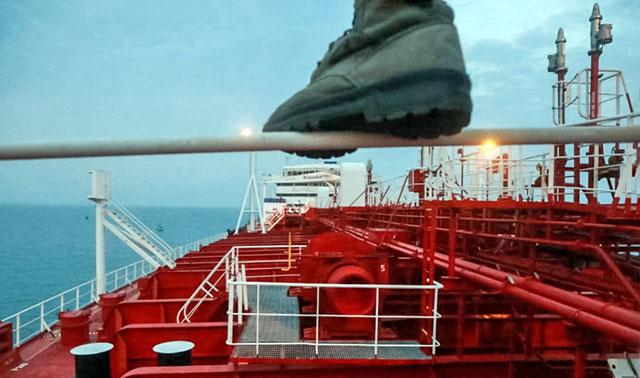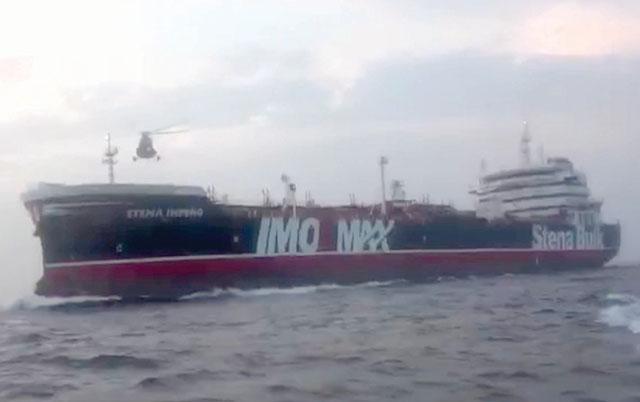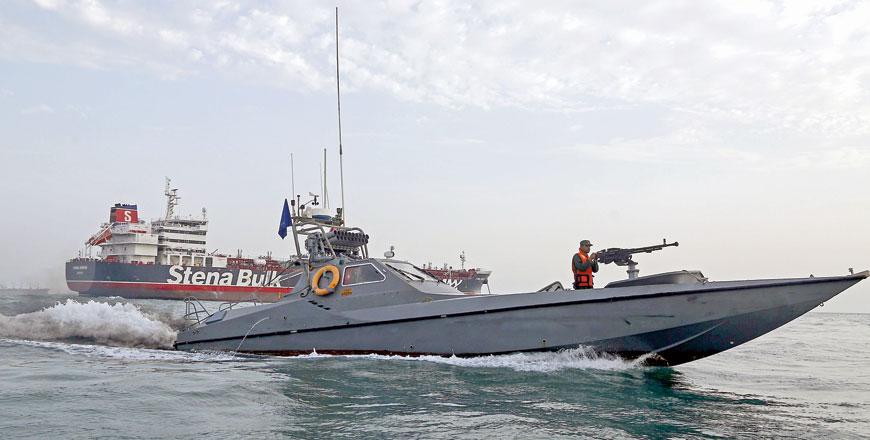You are here
Iran warns new British PM it will 'protect' Gulf waters
By AFP - Jul 24,2019 - Last updated at Jul 24,2019

An image grab taken from a broadcast by Islamic Republic of Iran Broadcasting on Monday shows a member of the Iranian Revolutionary Guards onboard a tanker Stena Impero as it is anchored off the Iranian port city of Bandar Abbas (AFP photo)
TEHRAN — Iran warned Britain's next prime minister Boris Johnson on Tuesday that it will "protect" waters of the oil-rich Gulf, amid a standoff between the two countries over the seizure of tankers.
In the face of rising hostilities with the United States, Iran's Islamic Revolutionary Guard Corps on Friday impounded a tanker sailing under the flag of US ally Britain.
The seizure of the Stena Impero has been seen as a tit-for-tat move after British authorities detained an Iranian tanker on July 4 in the Mediterranean on suspicion it was shipping oil to Syria in breach of EU sanctions.
"I congratulate my former counterpart, @BorisJohnson on becoming UK PM," Iranian Foreign Minister Mohammad Javad Zarif Tweeted after Johnson beat his rival, Foreign Secretary Jeremy Hunt, in a vote by party members.
"Iran does not seek confrontation. But we have 1500 miles of Persian Gulf coastline. These are our waters and we will protect them."
Iran has impounded the Stena Impero at its port of Bandar Abbas for allegedly breaking "international maritime rules".
In new footage aired by Iranian state television, the crew of 18 Indians, three Russians, a Latvian and a Filipino are seen sitting around a table and seemingly going about their daily routines.
"Throughout history, Iran has been and will be the main guardian of security and free navigation" in the Gulf, President Hassan Rouhani said late Monday, adding that Tehran was not seeking to stoke tensions.
The head of Iran’s navy, Rear Admiral Hossein Khanzadi, said in an interview published Tuesday that his forces use drones to closely observe “all enemy ships” going through the Gulf, “especially America’s”.
Nuclear meeting
Since the US began reimposing sanctions on Iran, tensions have mounted with drones shot down and tankers mysteriously attacked in sensitive Gulf waters.
At the height of the crisis, US President Donald Trump called off air strikes against Iran at the last minute in June after the Islamic republic downed a US drone.
Iran also said Monday it had arrested 17 suspects and sentenced some to death after dismantling a CIA spy network — claims Trump dismissed as “totally false”.
Tehran has been at loggerheads with Washington and its allies since May 2018, when Trump unilaterally withdrew the US from a landmark 2015 nuclear deal.
Iran said it would attend a meeting in Vienna this weekend with countries still party to the troubled accord.
The meeting was requested by the European parties to discuss the “new situation”, Iran said, referring to its reduced nuclear commitments under the deal in response to the US withdrawal.
The EU confirmed Iran would meet envoys from the remaining parties — Britain, China, France, Germany and Russia — on Sunday.
Tehran has already given up on complying with some of the deal’s limits on its nuclear programme in retaliation for the US withdrawal and what it sees as the failure of other parties to help it circumvent sanctions.
‘De-escalation’
Iran’s deputy foreign minister, Abbas Araghchi, travelled to France to deliver a message from Rouhani to his counterpart Emmanuel Macron, his ministry said.
French Foreign Minister Jean-Yves Le Drian confirmed he met the envoy who brought a message from Tehran.
“We are now pushing Iran back into the Vienna agreement,” he said, referring to the nuclear deal.
“I met earlier with President Rouhani’s special envoy to tell him that,” Le Drian added.
The latest efforts come after Macron’s top diplomatic adviser Emmanuel Bonne visited Iran and met with senior officials earlier this month to “piece together a de-escalation” strategy.
The 2015 deal curbed Iran’s nuclear programme in exchange for sanctions relief.
But on May 8 — a year after the US withdrawal — Iran said it would disregard certain limits on the programme as it was not receiving any benefits.
Iran has threatened further measures if the remaining parties to the deal fail to help it circumvent US sanctions, especially to sell its oil.
It has since exceeded the deal’s limits on its enriched uranium and heavy water stockpiles, as well as passing a cap on its uranium enrichment.
The 4.5 per cent enrichment level it reached is well below the more than 90 per cent required for a nuclear warhead.
Iran has yet to specify what other steps it may take, and has repeatedly emphasised its actions can be reversed “within hours” if European partners deliver on commitments.
Meanwhile, China described as “illegal” US sanctions imposed on its companies as part of Washington’s campaign against Iran.
Related Articles
LONDON — Iran ignored mounting European appeals on Saturday to release a British-flagged tanker as London denounced a "dangerous move" and s
DUBAI/LONDON — The British territory of Gibraltar will not yet release an Iranian oil tanker seized by Royal Marines in the Mediterranean de
TEHRAN — Iran warned Sunday that the fate of a UK-flagged tanker it seized in the Gulf depends on an investigation, as Britain said it was c













